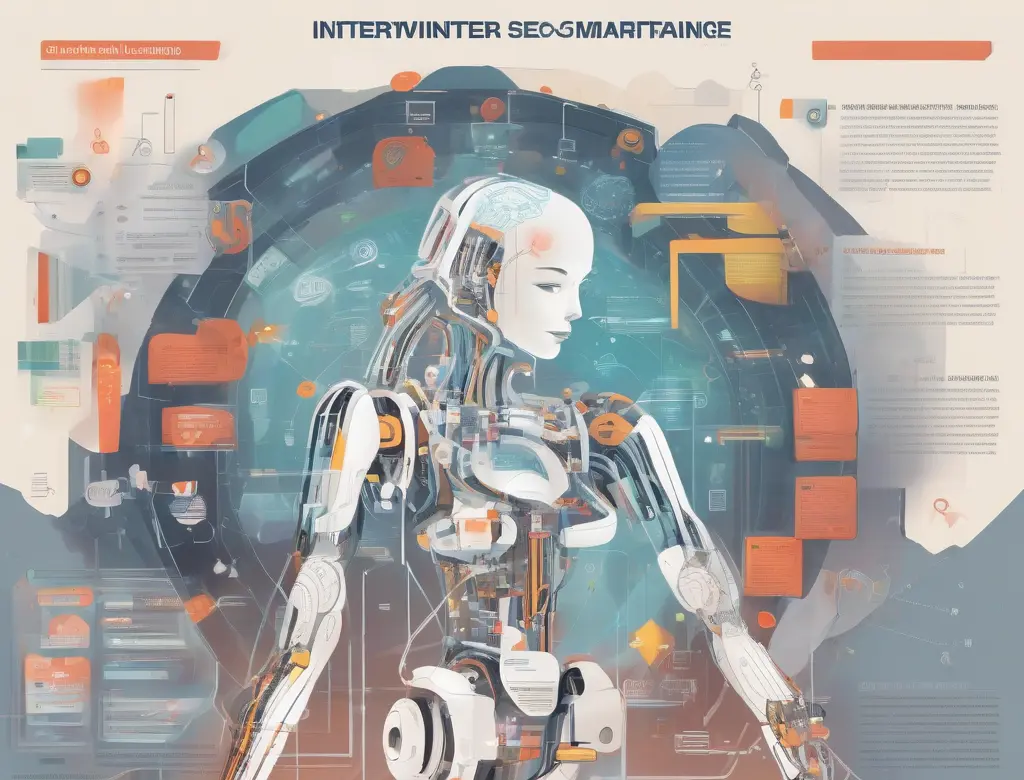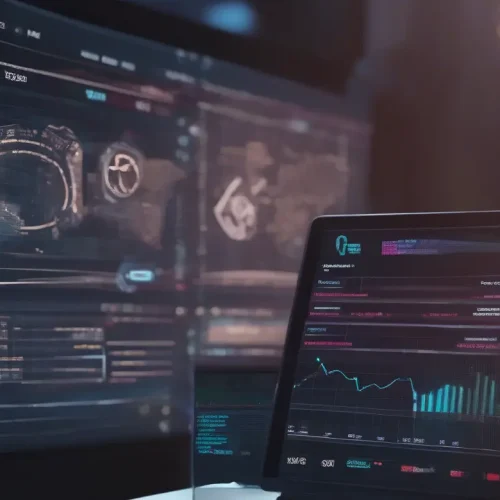How AI Changes the Future of SEO?: A Revolution in Search Engine Optimization
The digital world is evolving at an unprecedented pace, and one of the most powerful driving forces behind this change is Artificial Intelligence (AI). From complex search engine algorithms to content generation tools, AI is redefining the rules of Search Engine Optimization (SEO). It’s no longer possible to succeed by relying solely on traditional methods; now is the time to understand how AI changes the future of SEO and how we can keep pace with these transformations.
This article provides a comprehensive overview of AI’s impact on SEO, demonstrating how SEO professionals can leverage this new technology to improve their strategies. From understanding user intent to automating tasks and the emergence of “Generative Engine Optimization” (GEO), we will cover all dimensions of this digital revolution.
Understanding AI and the SEO Revolution
At its core, Artificial Intelligence is a set of technologies that enable machines to perform tasks typically requiring human intelligence. In SEO, this means using Machine Learning (ML) and Natural Language Processing (NLP) to better understand content, user intent, and semantic relationships.
Google has been using AI in its algorithms for years. RankBrain, introduced in 2015, was one of the first signs of this shift, helping Google better understand complex queries. Subsequently, the BERT (Bidirectional Encoder Representations from Transformers) algorithm in 2019 significantly enhanced Google’s ability to comprehend the context of words within a sentence. These algorithms not only help search engines understand your content better but also allow them to discern the actual intent behind a user’s search. This is where the importance of high-quality and relevant content becomes paramount.
In the past, SEO primarily focused on keywords and link building. However, the focus has now shifted towards providing the best possible answer to a user’s question, even if the keywords don’t precisely match. By analyzing billions of data points, AI identifies patterns that SEO professionals can use to improve their site’s ranking and visibility. This evolution directly answers the question of how AI changes the future of SEO, emphasizing that old approaches are no longer sufficient.
Search Generative Experience (SGE): The Future That Started Today
One of the newest and most significant changes AI has brought to SEO is the emergence of Google’s “Search Generative Experience” (SGE). SGE goes beyond displaying a list of blue links; this system uses generative AI to provide comprehensive and personalized summaries of relevant information directly on the Search Engine Results Page (SERP). These summaries, often displayed above organic results, aim to answer the user’s question quickly and completely.
This means that merely ranking first in search results is no longer enough; you must become a credible and reliable source for feeding AI algorithms. Your content must be structured, accurate, comprehensive, and understandable to machines to be used as a reference in SGE. This change creates new challenges for SEOs but also offers unparalleled opportunities for sites that produce high-quality, AI-optimized content. Understanding SGE is a critical step in comprehending how AI changes the future of SEO.
Shifting Paradigm: From Keywords to User Intent and User Experience
One of the most fundamental aspects of how AI changes the future of SEO is the transformation from merely focusing on keywords to a deep understanding of “user intent.” AI-powered search engines are no longer just looking for exact keyword matches between a query and page content; they strive to understand what the user truly wants, what question they have in mind, and what type of information they are seeking. This shift means that superficial, keyword-stuffed content will no longer be effective. Instead, your content must be comprehensive, valuable, and responsive to the user’s real needs.
For example, if a user searches for “best laptops for students,” AI attempts to provide not only a list of laptops but also considers crucial factors for a student, such as budget, battery life, weight, and performance. Content that thoroughly covers these aspects and offers practical insights will be deemed more valuable by AI. This approach requires deeper research into the target audience and a complete understanding of the user journey.
In addition to user intent, “User Experience” (UX) has gained unprecedented importance. Search engines can now interpret signals like bounce rate, dwell time on a page, and click-through rate (CTR). If users quickly leave your site after arriving, AI interprets this as a sign of dissatisfaction and can negatively impact your ranking. Site loading speed, responsiveness (mobile compatibility), ease of navigation, and content readability are all factors evaluated by AI. In other words, a well-designed website with engaging content not only satisfies users but also sends positive signals to search engines. This convergence of UX and SEO is a crucial answer to the question of how AI changes the future of SEO.
The concept of E-E-A-T (Experience, Expertise, Authoritativeness, Trustworthiness) is also increasingly evaluated by AI. Content written by experienced professionals and supported by credible sources will be more trustworthy and valuable in the eyes of AI. This means that alongside technical optimization, building credibility and expertise in your field has become an essential pillar of modern SEO strategy.
AI’s Role in Automating and Optimizing SEO Processes
One of the biggest advantages of how AI changes the future of SEO is its ability to automate repetitive tasks and optimize complex SEO processes. AI-powered tools can help SEO professionals operate more efficiently and dedicate more time to high-level strategies.
Content Generation and Optimization
AI can play a significant role in content creation. AI tools can generate drafts of articles, meta descriptions, compelling titles, and even content summaries. By analyzing vast amounts of data, these tools can suggest content that aligns with user intent and relevant keywords. Of course, AI-generated content always requires human editing, review, and the addition of human and expert touches to ensure high quality and trustworthiness in the eyes of search engines. Nevertheless, using AI can dramatically speed up the content creation process.
Data and Competitor Analysis
AI can analyze massive amounts of data at unparalleled speed. This includes data related to site performance, user behavior, and competitor strategies. AI tools can identify patterns and trends that might go unnoticed by humans. For example, they can pinpoint new keyword opportunities, competitor weaknesses, and areas where your site needs improvement. These deep analyses provide the basis for strategic decisions to improve SEO.
Prompt Engineering
In using AI tools, “Prompt Engineering” has become a critical skill. This refers to the ability to write precise and effective instructions for AI models to get the best possible output from them. A good prompt can make the difference between mediocre and exceptional content. SEO professionals who develop this skill can use AI as a powerful assistant for generating ideas, research, and optimization.
Predicting Algorithm Changes
By continuously analyzing data and search engine behavior, AI can help predict potential changes in algorithms. This capability allows SEO professionals to adjust their strategies before major changes occur and be prepared to maintain their site’s ranking. These predictive insights are a significant competitive advantage in the ever-changing world of SEO.
Introducing Generative Engine Optimization (GEO): Beyond Traditional SEO
With the advent of Large Language Models (LLMs) and AI chatbots like ChatGPT and Gemini, a new concept called “Generative Engine Optimization” (GEO) is emerging. This concept goes beyond traditional SEO, which primarily focuses on ranking in conventional search results (SERP). GEO means optimizing content in a way that is understandable, learnable, and usable not only by link-based search engines but also by generative AI engines.
As AI changes the future of SEO, AI models now gather information from the web and generate answers as synthesized summaries, rather than just displaying links. This means your content must be structured so that these models can easily process it, learn from it, and use it in their responses to users. Optimizing for GEO includes the following:
- Structured Data: Proper use of Schema Markup helps AI understand the structure and meaning of your content better. This makes your information more accessible to SGE and other generative engines.
- Clear and Concise Content: Content should be written to be understandable by both humans and AI. Sentences should be clear and unambiguous. Avoid keyword stuffing and focus on providing accurate and organized information.
- Learnability: Your content should be deep and comprehensive so that AI can extract sufficient knowledge from it. Instead of focusing on individual keywords, concentrate on fully covering a topic and providing complete answers to related questions.
- Citable Content: Just as users seek credible sources, AI also looks for citable and authoritative sources. Producing original, research-based, and expert content with high E-E-A-T is crucial for GEO optimization.
- “Open” and Indexable Content: AI models primarily learn from websites whose content is easily crawlable and indexable. Sites with content hidden behind paywalls or technical barriers are likely to be overlooked by these models.
GEO is a step forward in the evolution of SEO and indicates that SEO professionals must think beyond ranking on Google and consider how their content can become a valuable resource for the AI ecosystem. This new perspective provides a definitive answer to how AI changes the future of SEO and outlines future strategies.
Challenges and Opportunities for SEO Professionals
The changes brought about by artificial intelligence have presented both challenges and countless opportunities for SEO professionals. Understanding these dimensions is essential for success in the new landscape.
Challenges:
- High Speed of Change: AI algorithms are evolving rapidly. Maintaining knowledge and continuously updating with these changes is a major challenge. SEO professionals must constantly be learning and adapting.
- Increasing Complexity: Understanding the precise functioning of AI algorithms like SGE and GEO is far more complex than traditional algorithms. This requires a deeper understanding of data science and machine learning.
- Risk of Over-reliance on AI: While AI tools can be incredibly useful, over-reliance on them without human oversight and creativity can lead to low-quality or generic content that lacks value in the eyes of search engines.
- Combating Low-Quality Content: With the ease of content generation by AI, there is also a risk of increased spam and low-value content. Search engines are striving to filter out this type of content, and this is a challenge for sites looking to gain visibility.
Opportunities:
- Increased Efficiency: AI can automate many repetitive and time-consuming SEO tasks, including keyword research, competitor analysis, and even content draft generation. This allows SEO professionals to dedicate more time to high-level strategies, deeper analysis, and innovation.
- Advanced Data Analysis: AI tools can extract patterns and insights from vast amounts of data that would be impossible for humans. These advanced analyses help SEOs make better decisions and optimize their strategies.
- Content Personalization: AI enables content and user experience personalization at scale. This can lead to higher conversion rates and greater user satisfaction.
- Development of New Skills: The need for skills such as prompt engineering, AI data analysis, and a deeper understanding of algorithmic behavior creates opportunities for professional development and career advancement for SEO professionals. Future SEOs must be more strategists and analysts than mere technicians.
- Pioneering GEO: For those who quickly familiarize themselves with the concept of GEO and optimize their content for this new generation of generative engines, there are significant opportunities to gain a competitive advantage.
In summary, how AI changes the future of SEO is a story of evolution, not destruction. SEO professionals who can adapt, learn, and intelligently use these new tools and concepts will not only survive but will thrive remarkably in this new digital landscape.
Conclusion: Keeping Pace with AI Developments in SEO
Artificial intelligence is undoubtedly reshaping the SEO landscape, and the answer to how AI changes the future of SEO is clear and unambiguous: this technology not only helps search engines understand user intent and content more deeply but also automates and revolutionizes optimization processes. From the emergence of Search Generative Experience (SGE) to the formation of Generative Engine Optimization (GEO), we are witnessing a paradigm shift where quality, relevance, user experience, and the machine-readability of content are more important than ever before.
To succeed in this new era, SEO professionals must move beyond traditional approaches and upgrade their skills. Learning prompt engineering, focusing on producing comprehensive and authoritative content, optimizing for structured data, and gaining a deep understanding of user intent are all key elements for maintaining and enhancing competitive positioning.
AI is not a threat, but an unparalleled opportunity. An opportunity to create more valuable content, provide better user experiences, and achieve more powerful SEO results. Embrace these developments and leverage the power of artificial intelligence to advance your digital goals.
Sources:
External sources used in this article include articles from Virgool.io, Kavoshsite.com, Tesmino.com, and educational videos related to SEO and AI.






